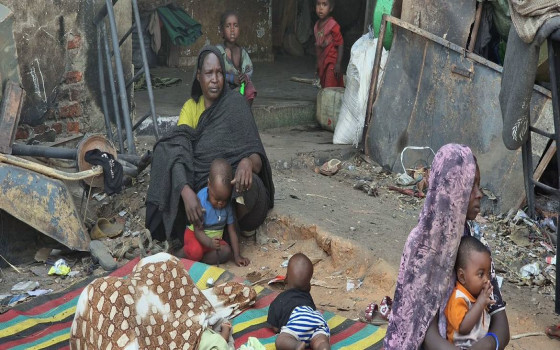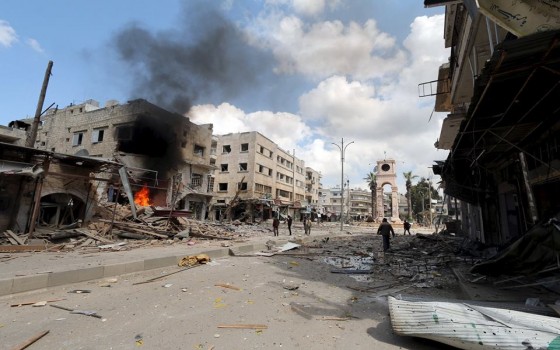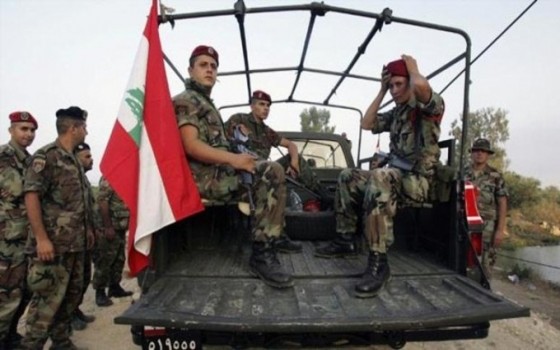
Sudan: Floods, cholera and renewed fighting increase suffering.. World Health Organization calls on the world not to let down the Sudanese people

- Europe and Arabs
- Monday , 9 September 2024 10:1 AM GMT
Khartoum: Europe and Arabs - Agencies
The suffering faced by the Sudanese people is increasing, whether due to human or natural causes. The country has been hit in the past few hours by floods, bombings and the spread of the epidemic, all of which have led to an increase in the number of victims among the Sudanese people.
The death toll from heavy rains has risen to 205, while the total number of deaths from cholera has increased to 185, according to the Sudanese Ministry of Health.
It stated in a statement that the number of infections due to floods and rains has reached 886, including 205 deaths. In the same context, 268 cases of cholera have been recorded in Sudan, including 185 deaths, indicating that the "Ministry" indicated that the latest death toll was recorded in the states of Kassala (east), River Nile (north) and Gedaref (east). The ministry stated that the total number of infections in the seven states affected by the epidemic rose to 5,692, and that the highest infection rate was recorded in Kassala, New Halfa, Khashm al-Qirba (east), Berber, and Ad-Damar (north).
On August 12, the Sudanese authorities announced that cholera was considered an epidemic.
On the other hand, the International Organization for Migration revealed earlier that more than 172,000 Sudanese had been displaced due to floods and rains in 15 states (out of 18) since the beginning of last June.
This year's natural and health disasters coincide with the continued suffering of the Sudanese people as a result of the war between the Sudanese army and the Rapid Support Forces since 2023, which resulted in about 18,800 deaths and nearly 10 million displaced persons and refugees, according to the United Nations.
21 people were killed on Sunday in a bombing that targeted the market of the city of Sennar in southeastern Sudan, attributed to the Rapid Support Forces, the day after the country's government refused to deploy an independent force to protect civilians.
The Sudanese Doctors Network reported that the death toll reached 21, noting that "more than 70 people were also injured" in this artillery shelling, which it attributed to the Rapid Support Forces led by Mohamed Hamdan Dagalo.
The fighting broke out in Sudan in mid-April 2023, between the army led by Abdel Fattah al-Burhan, who is also the head of the Sovereignty Council and the country's de facto ruler, and the Rapid Support Forces led by his ally and former deputy Dagalo, known as Hemeti.
The conflict has pushed the country to the brink of famine, and humanitarian organizations have been denouncing the lack of security that prevents them from delivering aid for months.
For his part, the Director-General of the World Health Organization expressed his shock at the conditions of the children he met in Sudan. He said that the Sudanese are suffering from a comprehensive set of crises, including the ongoing conflict, the largest displacement crisis in the world, and the famine that has struck some areas.
At a press conference in Port Sudan at the end of his visit to the country, Dr. Tedros Ghebreyesus, the Director-General of the organization, indicated that 25.6 million people in Sudan - more than half the population - are expected to face high levels of acute food insecurity. According to the United Nations News website in its daily bulletin
On Saturday, Dr. Tedros visited a WHO-supported paediatric health facility in Port Sudan that provides life-saving care for severely malnourished infants. He said he was shocked by the condition of many young children suffering from emaciation and by the horrific testimonies of their mothers who have been displaced several times due to insecurity and are now grateful "to have found refuge in this clinic."
In his press conference, Dr. Tedros warned of the spread of diseases such as cholera, malaria, dengue fever and measles, with the risk of Impox (monkeypox). He pointed to the many reports of conflict-related sexual violence and the near-total collapse of the health system, with 70 to 80 percent of health facilities across Sudan not fully functioning.
A forgotten crisis
“The international community seems to have forgotten Sudan, and is no longer paying much attention to the conflict tearing it apart and its consequences for the region. That is why I came to Sudan,” said the senior UN official.
Dr Tedros was accompanied during the visit by Dr Hanan Balkhy, WHO Regional Director for the Eastern Mediterranean. They met with a number of partners responding, and both officials called for urgent scale-up of action to provide more resources, humanitarian access and security for aid workers, health workers and patients.
The war, which broke out in April 2023 between the Sudanese Armed Forces and the Rapid Support Forces, has killed more than 20,000 people and displaced more than 10 million.
The WHO Director-General warned of the scale of the crisis and the insufficient response to the conflict and the suffering it is causing. He said this was reflected in inadequate funding levels, the high number of attacks on health facilities – which exceeded 100 – and attacks on other aid workers and civilians, and the inability to secure unhindered humanitarian access across borders and across the front lines of the conflict.
Dr. Tedros called on the world to “wake up and help Sudan out of the nightmare it is going through”. He outlined a number of demands, the first of which was an immediate ceasefire leading to a lasting political solution, saying that “peace is the best medicine”.
He also called for the protection of health facilities, medical workers and patients, sustainable access for supplies and assistance, expanded disease detection, and increased coverage of immunization against cholera, polio, measles and other diseases in affected areas. He called for a massive increase in funding from the international community to strengthen the response.
He said this would save millions, mostly women and children, living on the brink of survival, and provide the calm that all people desperately need and deserve. He stressed the need not to let the people of Sudan down.












No Comments Found